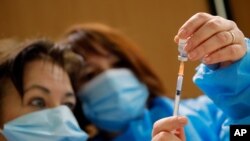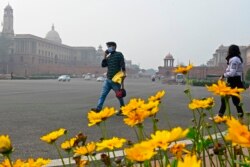The Johns Hopkins Coronavirus Resource Center reported early Saturday that there are nearly 90 million global COVID-19 cases.
The United States has more cases than anyplace else with almost 22 million infections. India comes in second with about half the infections of the U.S. -- nearly 10.5 million cases.
The U.S. reported more than 300,000 new COVID-19 cases Friday, a record-breaking number.
With the virus surging in some U.S. states, President-elect Joe Biden says he believes in the rapid release of the COVID-19 vaccines so whoever wants it will have access to it. The second dose of the vaccine is given weeks later.
Infectious disease expert Anthony Fauci said earlier this week he is hopeful that when Biden is in office, the U.S. will be able to deliver to the U.S. public “1 million vaccinations per day, as the president-elect has mentioned.”
A surprising development, however, has emerged in some implausible locations. The Associated Press reports that some health care workers in hospitals and nursing homes are hesitant about being vaccinated. The AP said its investigation uncovered that in some places as much as 80% of the medical staff has declined the vaccinations.
One doctor told the wire service he wanted to wait a few months to “see what the data show.” He said, “I don’t think anyone wants to be a guinea pig.”
A nurse said she was delaying her vaccination because of the vaccine’s “unknown side effects.”
Some medical personnel, however, are reversing their hesitancy. One medical director told AP that “The biggest thing that helped us to gain confidence in our staff was watching other staff members get vaccinated, be OK, walk out of the room, you know, not grow a third ear, and so that really is like an avalanche,” causing staff members to rethink how they view the inoculations.
Some countries are also taking a wait-and-see attitude when it comes to vaccines. The British newspaper The Guardian reported that Australia, New Zealand, Taiwan, Japan and South Korea are among the countries that have decided to see what is happening in the rest of the world with the inoculations.
Jennifer Martin, an Australian physician who is also on the advisory committee of the sole purchaser for pharmaceuticals in New Zealand, said, “Why would you put people at risk when if you wait a bit longer, you can get more information?”
The head of the World Health Organization, Tedros Adhanom Ghebreyesus, Friday urged the manufacturers of COVID-19 vaccines and the wealthier countries to make them available to poorer countries. He said of the 42 countries that are rolling out coronavirus vaccines, most of them are high-income nations and a few are middle-income countries.
Iran’s Supreme Leader, Ayatollah Ali Khamenei, has banned imports of COVID-19 vaccines from America’s Pfizer-BioNTech and Britain’s AstraZeneca, citing a mistrust of Western countries.
“I really do not trust them,” Khamenei said Friday in a televised speech. “Sometimes they seek to try out their vaccines on other nations to see if it works or not,” he said. “I am not optimistic [about] France, either.”
Khamenei said he continues to allow the import of vaccines from other "safe" places and still supports his country’s efforts to produce its own vaccine.
Iran began human trials with its vaccines in December and officials hope they will be available in the country in a few months.
In Saudi Arabia, the country’s 82-year-old monarch, King Salman, received the coronavirus vaccination, according to video published by state media Friday. Saudi health officials recorded just 97 new cases of the virus Friday and four deaths as infections in the country continue to decline.
India said Saturday it has recorded 18,222 new COVID cases in the past 24 hours. The health ministry also said it has now recorded 90 cases of the British variant of the virus.










